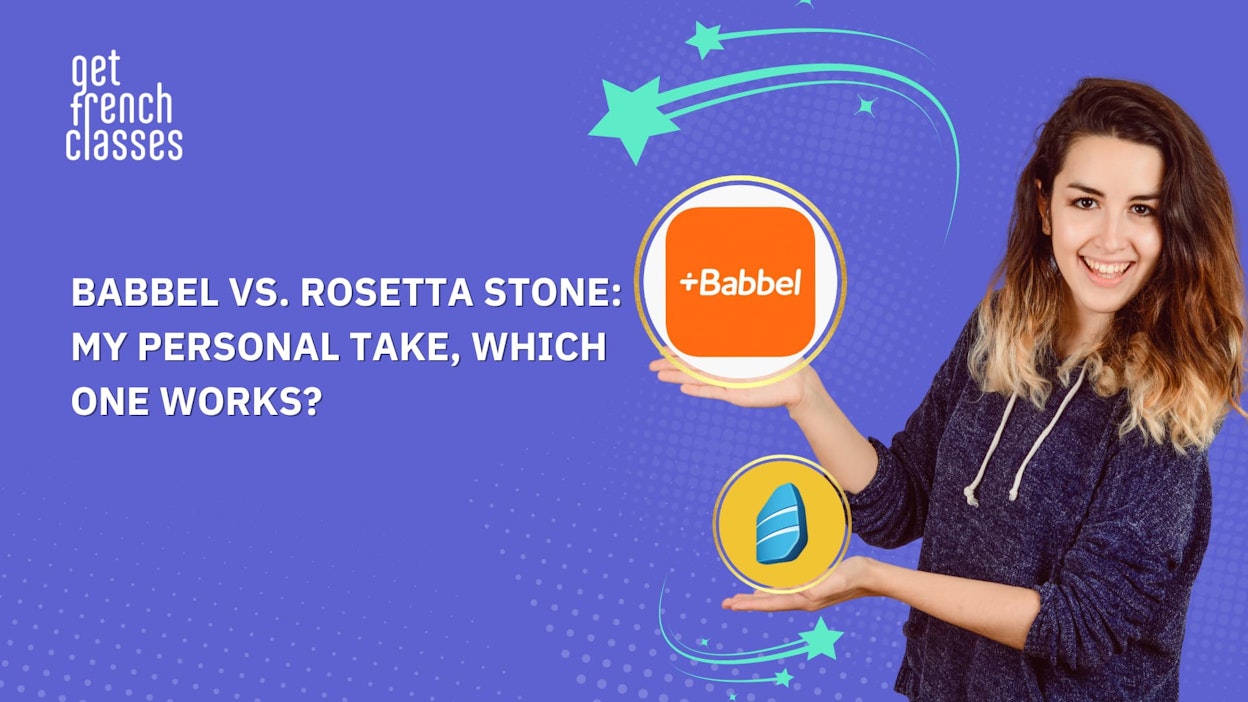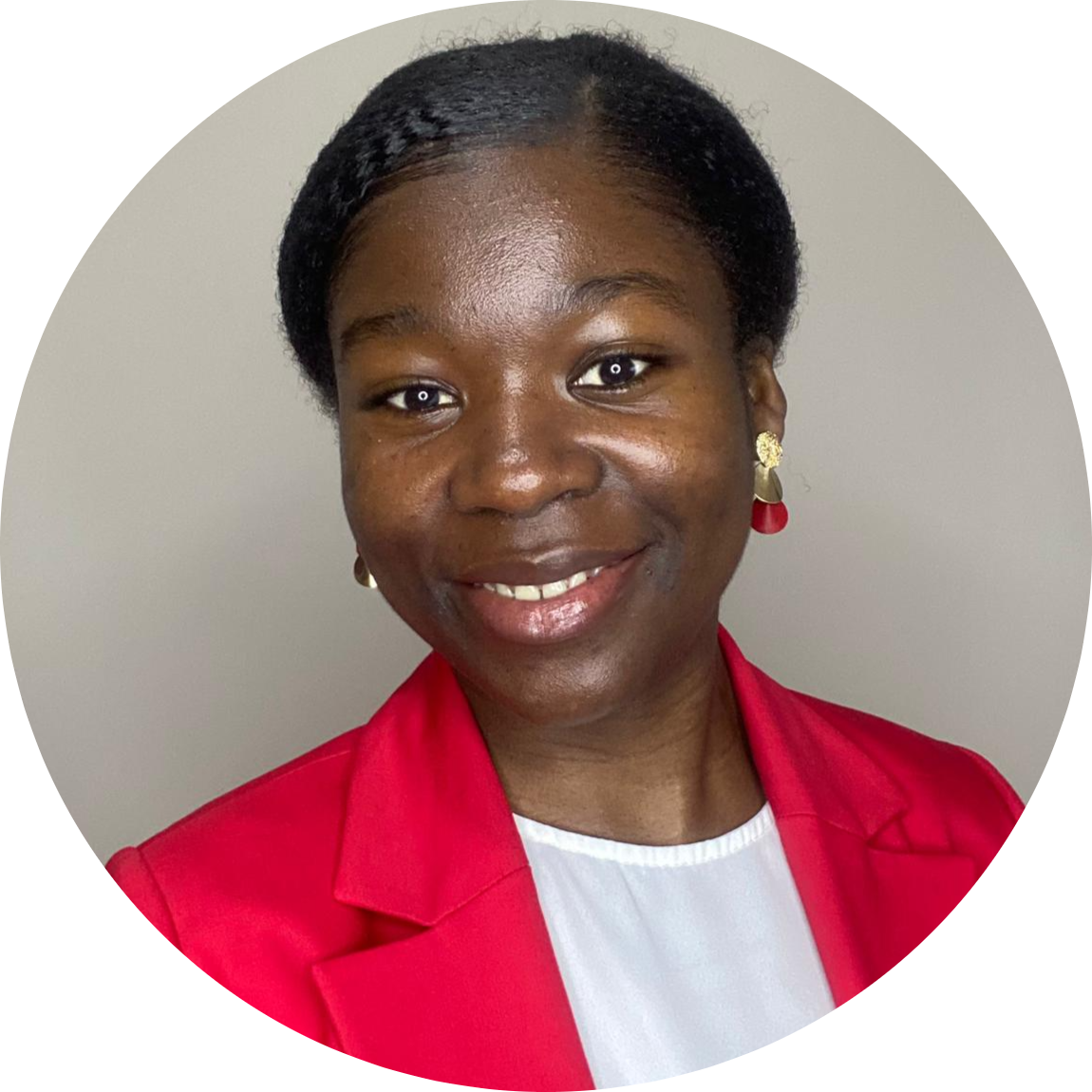My journey with language learning apps has been a rollercoaster of high hopes and reality checks.
As a language enthusiast, I've tried everything from flashcards to immersion programs. But two names kept popping up in every conversation about language learning: Babbel and Rosetta Stone.
I decided to compare these titans of the language app world because, let's face it, they're unavoidable in the language learning landscape.
With their aggressive marketing and big promises, I wanted to see if they lived up to the hype.
Could these popular apps really be the key to language fluency? Or were they just clever marketing wrapped in sleek interfaces?
My first impressions of Babbel and Duolingo
As a language lover, I've tried many language-learning apps. Most of these apps are decent enough, but let's be real, a high number of them aren't worth the storage space on your phone.
But here's the thing—no matter how many new apps pop up, Babbel and Rosetta Stone always seem to dominate the conversation. It's like they're the celebrities of the language-learning world. So, naturally, I couldn't ignore them. I had to see what all the fuss was about.
Even though I ended up not sticking with either of them long-term, my journey with these apps was... interesting, to say the least. Let me tell you my story.
How I discovered Babbel and Rosetta Stone and what drew me to each platform
My encounter with Babbel was back in 2018. I was gearing up for a trip to Zagreb, Croatia, and I wanted to learn some basic Croatian. I stumbled upon Babbel while searching for a quick and easy way to pick up some essential phrases.
What drew me to Babbel was its promise of practical, conversation-based learning. I didn't want to waste time conjugating verbs or memorizing random words.
I needed real, usable language skills, and I needed them fast. Babbel's structured approach and bite-sized lessons seemed perfect for my busy pre-travel schedule.
Rosetta Stone, on the other hand, had been on my radar for years. I mean, who hasn't seen their aggressive TV advertising campaigns?
Back in the day, they were everywhere—airports, TV commercials, you name it. Their promise of learning a language the "natural" way, just like a child, was intriguing.
I decided to give Rosetta Stone a shot in 2016 when I was looking for an affordable alternative to private and group classes.
At the time, I thought I'd found the perfect combination—Rosetta Stone for its immersive approach and Duolingo for some extra practice. I was feeling pretty smart about my budget-friendly language-learning strategy.
My initial expectations vs. reality
Oh boy, where do I start?
With Babbel, I expected to be chatting away in Croatian in no time. I imagined myself confidently ordering coffee in Zagreb, maybe even striking up conversations with locals.
The reality? Well, it wasn't quite the linguistic transformation I'd hoped for.
Don't get me wrong, Babbel did teach me some useful phrases and basic helpful grammar tips. But when I actually got to Croatia, I realized there's a big difference between completing app lessons and having a real conversation.
I could ask for directions, sure, but understanding the rapid-fire response? That was a whole other story.
As for Rosetta Stone, I had high hopes for their immersion method. I thought I'd absorb Spanish like a sponge, just by looking at pictures and repeating phrases. Reality hit hard.
While the language learning program did help me associate words with images, I found myself constantly frustrated by the lack of explanations.
I mean, come on, I'm an adult. I want to know why I'm saying things a certain way. Rosetta Stone's approach of leaving me to figure out grammar rules on my own was more annoying than enlightening.
In both cases, I realized that while these apps could give me a basic foundation, they weren't the magic bullets for language fluency I'd hoped they'd be. It was a wake-up call that sent me back to the drawing board—and eventually to live classes—in my quest for true language proficiency.
Babbel or Rosetta Stone: What each platform promises
Both Babbel and Rosetta Stone are primarily catering to beginners. If you're expecting to become fluent solely through these apps, well, I've got a bridge to sell you.
But for what they are—introductory tools for language learners—they each try to bring something unique to the table. Neither is a complete solution, but in their respective lanes, they're doing their best to give you a solid start.
Babbel's conversation-based approach
I was intrigued when I first heard about Babbel's conversation-based approach. The idea of learning practical, everyday phrases right off the bat appealed to me. I mean, who doesn't want to start speaking from day one, right?
Babbel claims to be different from other apps by focusing on real-life dialogues and practical vocabulary.

They promise to get you to speak useful phrases quickly without getting bogged down in grammar rules or irrelevant vocabulary. It sounds great in theory, doesn't it?
But here's the thing, Babbel does a decent job with their lessons, but this "conversation-based" approach? It's nothing new under the sun. Plenty of language learning courses have been doing this for years.
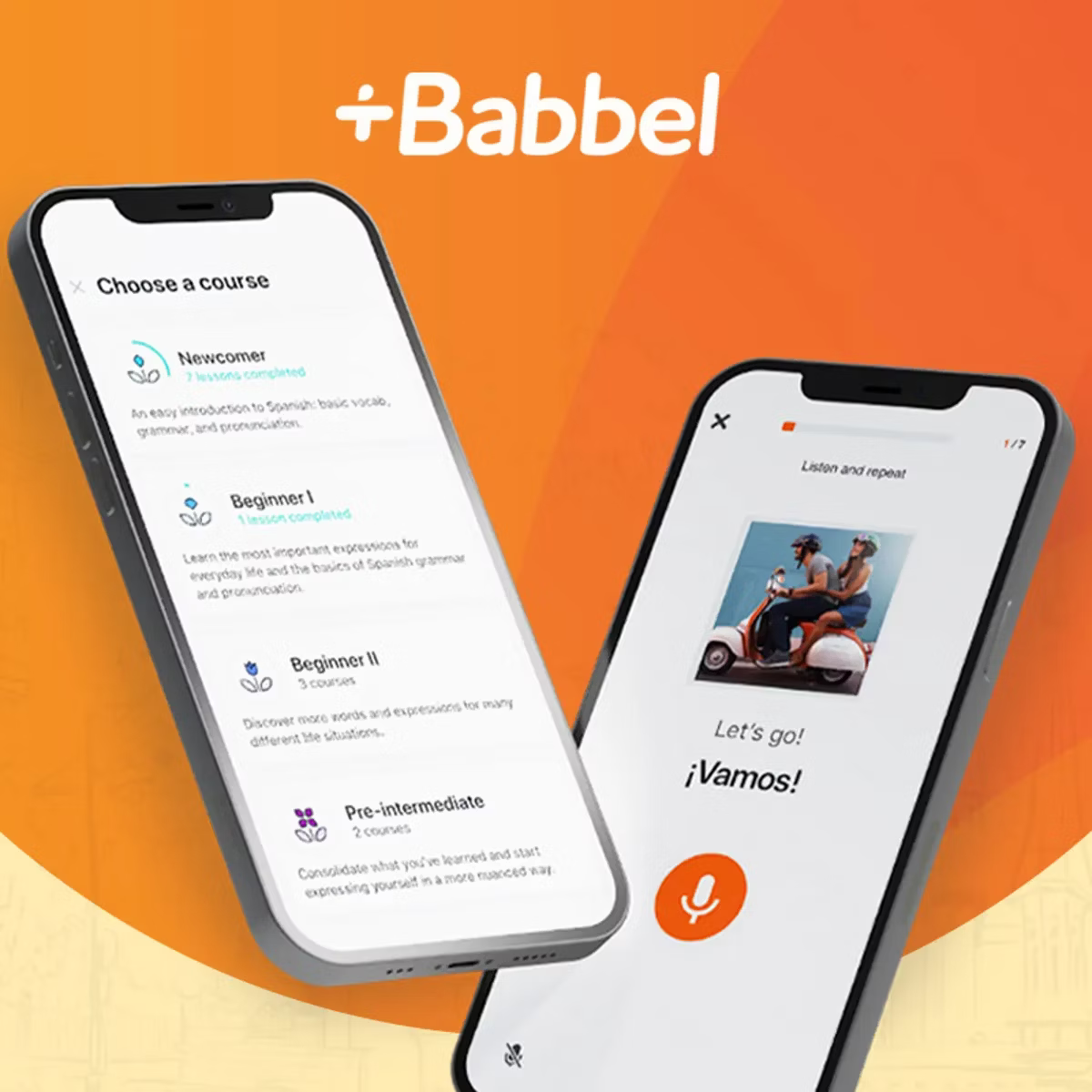
What Babbel does have going for it is some seriously slick marketing. They've managed to position themselves as this revolutionary language-learning tool. But when you strip away the fancy advertising, you're left with a solid, but fairly standard, language-learning app.
And let's talk about those limits. Sure, you can learn some useful phrases, but in real conversations? That's a whole different game.
Babbel can give you the building blocks, but it can't teach you how to think on your feet in a real conversation. That's something you can only get from, well, real conversations.
Rosetta Stone's immersion method
Now, let's talk about Rosetta Stone and their famous "immersion" method.

The appeal is obvious—learn a language naturally, just like a child does. No translations, no explanations—just pure immersion. Sounds almost magical, doesn't it?
I was easily sold on the idea. Learning a language without the drudgery of grammar rules and vocabulary lists? Sign me up! It promised to be intuitive, natural, and effortless. Who wouldn't want that?
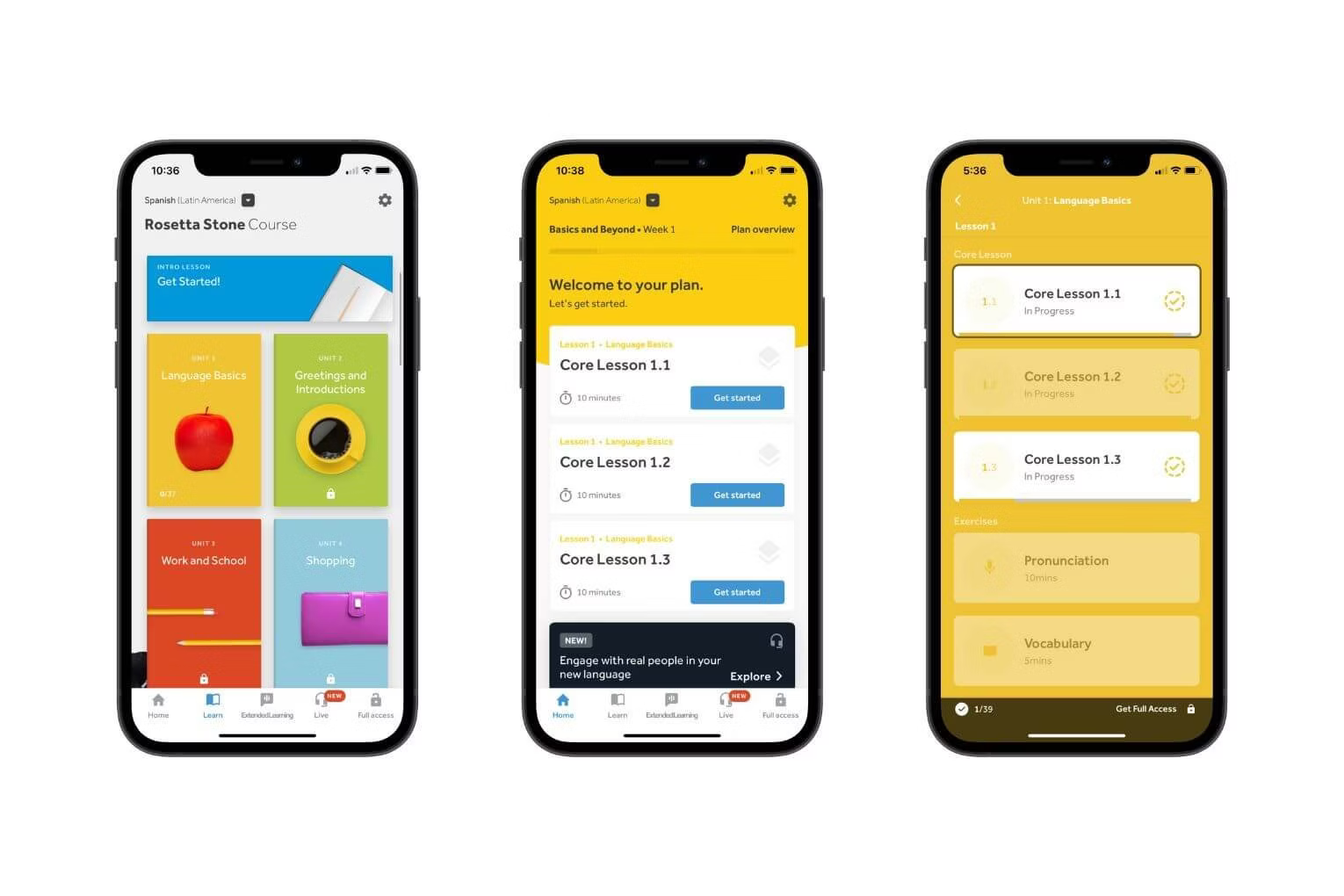
But here's where I think this promise falls flat on its face—we're not children anymore. Our brains don't work the same way they did when we were babies, absorbing language like little sponges.
As adults, we have analytical skills. We want to understand the ‘why' behind language structures. We can't just erase our native language and start from scratch. Rosetta Stone's method ignores these differences between child and adult language acquisition.
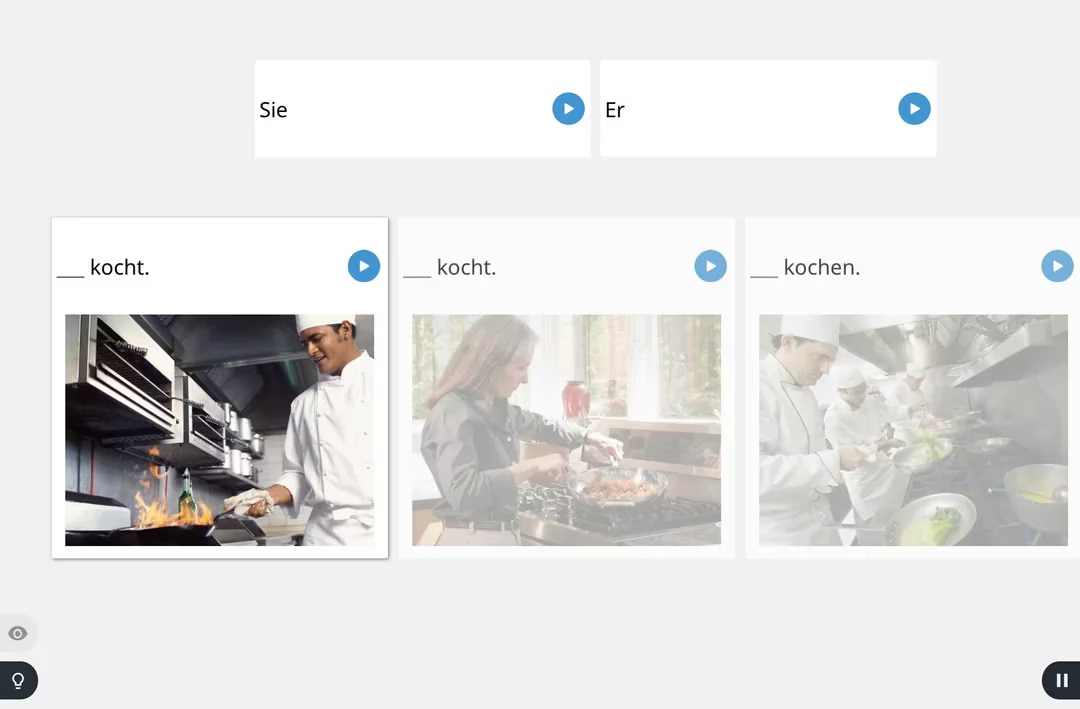
I found myself constantly frustrated, trying to guess at grammar rules and word meanings without any explanation. It's like they handed me a puzzle but hid half the pieces. Sure, I could figure some things out through context, but it was far from efficient or natural.
The reality is that true immersion happens when you're surrounded by a language 24/7, not when you're staring at pictures on a screen for 30 minutes a day. Rosetta Stone's "immersion" is more like dipping your toe in a kiddie pool and calling it deep-sea diving.
Don't get me wrong—there's value in learning to associate words directly with concepts rather than translations. But to call this method natural or complete? That's stretching the truth thinner than a crepe.
My experience with the lessons and my advice to you
Let's start with Babbel.
The structure of that language learning app is pretty straightforward. You start with some vocabulary, move on to some grammar lessons, and then practice what you've learned in context.
But here's what I disliked: the exercises can get repetitive. I mean, how many times can you match a word to a picture before you begin to feel like a trained monkey?
And don't get me started on the voice recognition software. Half the time, it couldn't understand me even when I was speaking perfectly (or so I thought).
Now, I've got to give credit where it's due. The bite-sized format? That's where Babbel shines.
Each lesson is about 10–15 minutes long, which is perfect for someone with the attention span of a goldfish (guilty as charged). It's just enough time to learn something new without feeling overwhelmed.

As for fitting it into my busy schedule, it was a breeze. I'd squeeze in a lesson during my morning coffee or while waiting for the bus. Sometimes, I'd even do a quick lesson during my lunch break. It was like snacking on language learning throughout the day.
My advice? Use Babbel as a supplement, not your main course. It's great for building vocabulary and getting a feel for the language, but don't expect it to make you fluent on its own.
Now, let's talk about Rosetta Stone and its infamous image-based learning.
The idea is simple: look at a picture, hear a word or phrase, and magically understand what it means. No translations, no explanations, just pure intuition. Sounds great, doesn't it?
Well, let me tell you about my frustrations. As an adult language learner, I wanted to know why things were the way they were.
-
Why does this verb end this way?
-
Why is the word order different here?
But Rosetta Stone just kept showing me more pictures, like a parent pointing at things and repeating words to a toddler. It was maddening at times.
That being said, there were moments when I found it helpful. For basic nouns and simple actions, the picture method works well.
I could easily learn words like "apple," "run," or "blue" without needing a translation. It was also great for associating words directly with concepts rather than with English translations.
But here's when it didn't work: complex ideas, abstract concepts, or anything requiring nuanced understanding. Try explaining "democracy" or "empathy" with just pictures. Go on, I'll wait.
My advice? Use Rosetta Stone for building basic vocabulary and getting a feel for how the language sounds. But don't rely on it for grammar or more advanced concepts. And for heaven's sake, don't expect to become fluent just by looking at pictures.
Language learning requires more than just visual associations; it also needs context, explanation, and real-world practice.
Babbel vs Rosetta Stone: The pros of each app
| Babbel | Rosetta Stone |
|---|---|
| Bite-sized lessons (10-15 minutes) fit easily into busy schedules | Consistent method across all languages |
| Clear grammar explanations in your native language | High-quality audio from native speakers |
| Focus on practical, conversational language | Strong emphasis on listening and speaking from the start |
| Variety of exercise types to keep things interesting | The visual learning approach can be helpful for some learners |
| Incorporates cultural notes and real-life scenarios | No translation crutch, encouraging thinking in the target language |
| Personalized review sessions reinforce learning | Immersive experience can be engaging and fun |
| More affordable than Rosetta Stone | Offers a live tutoring option (at additional cost) |
| User-friendly interface and smooth progression between lessons | Available in more languages than Babbel |
| Speech recognition for pronunciation practice | TruAccent™ speech recognition technology for pronunciation |
| Teaches language in the context of real-life situations | Builds intuition for language patterns |
Babbel vs Rosetta Stone: The cons of each app
| Babbel | Rosetta Stone |
|---|---|
| Limited speaking practice with real conversations | Lack of explicit grammar explanations can be frustrating |
| Content depth varies by language (less for less popular languages) | Repetitive exercises can become monotonous |
| Voice recognition technology can be glitchy | Image-based learning doesn't work well for abstract concepts |
| Doesn't prepare you for complex, real-world interactions | It can be confusing for beginners without any guidance |
| Cultural insights, while present, could be more in-depth | More expensive than many competitors |
| There is no offline mode for the mobile app (as of my last use) | Doesn't teach colloquialisms or informal language |
| Doesn't offer as many languages as some competitors | One-size-fits-all approach doesn't cater to different learning styles |
| Progress can plateau at intermediate levels | Doesn't prepare you for real-world conversations effectively |
| Lacks in-depth reading and writing exercises | Limited customization of the learning path |
| There is no placement test for those with prior knowledge | It can be frustrating for analytical learners who prefer explanations |
Why I think neither Babbel nor Rosetta Stone is enough on its own
There are tons of other language learning tools out there. But let me be straight with you—if you're dreaming of becoming fluent in a new language using just Babbel or Rosetta Stone, it's time for a reality check.
I've been down this road, and I can tell you from experience that neither of these apps is going to get you fluent on its own.
Here's why:
First off, both Babbel and Rosetta Stone suffer from a common problem—they're just too limited in scope.
They're great for getting you started, sure, but they're like training wheels on a bike. At some point, you need to take them off and actually ride.
And let's talk about the elephant in the room—real conversation practice. Both apps fall woefully short in this department.
Babbel gives you some dialogue practice, but it's scripted and predictable.
Rosetta Stone? Well, repeating phrases on your phone isn't exactly riveting conversation. Neither prepares you for the unpredictable nature of real-world interactions.
Then there's the issue of cultural context. Language isn't just words and grammar; it's a window into a whole culture.
Both apps touch on this, but it's surface-level at best. You're not going to understand the nuances of French humor or Japanese etiquette from these apps alone.
Another major drawback? lack of writing practice.
Sure, you can type in some words or phrases, but composing emails, writing essays, or even crafting a decent text message in your target language? You're on your own.
And let's not forget about listening comprehension. Both apps use clear, slow speech in their audio. That's great for beginners learning their target language, but for real native speakers? They mumble, they use slang, and they speak at lightning speed. Neither Babbel nor Rosetta Stone truly prepares you for that.
Here's the kicker: language learning isn't linear. It's messy, it's complex, and it requires a variety of approaches. Babbel and Rosetta Stone both present language learning as a neat, orderly process.
But in reality, you need flexibility, you need to be able to jump around, focus on your weak points, and adapt your learning style as you go.
Don't get me wrong, these apps aren't useless. They're a good starting point, especially for absolute beginners. But thinking they're all you need is like believing you can become a master chef by only using a microwave.
Rosetta Stone vs. Babbel vs Get French Classes: A third alternative you should consider if you’re learning French
If you're serious about learning French, you will find that neither Rosetta Stone nor Babbel fully meets your needs.
While these apps can help build basic vocabulary and grammar, they often fall short when it comes to developing real-world communication skills (language skills like speaking skills) and providing structured, comprehensive learning paths.
Fortunately, there's a third alternative that addresses many of the common challenges faced by French language learners: Get French Classes.

Our programs are designed to take your French skills from zero to conversational fluency, without breaking the bank or requiring a major time commitment.
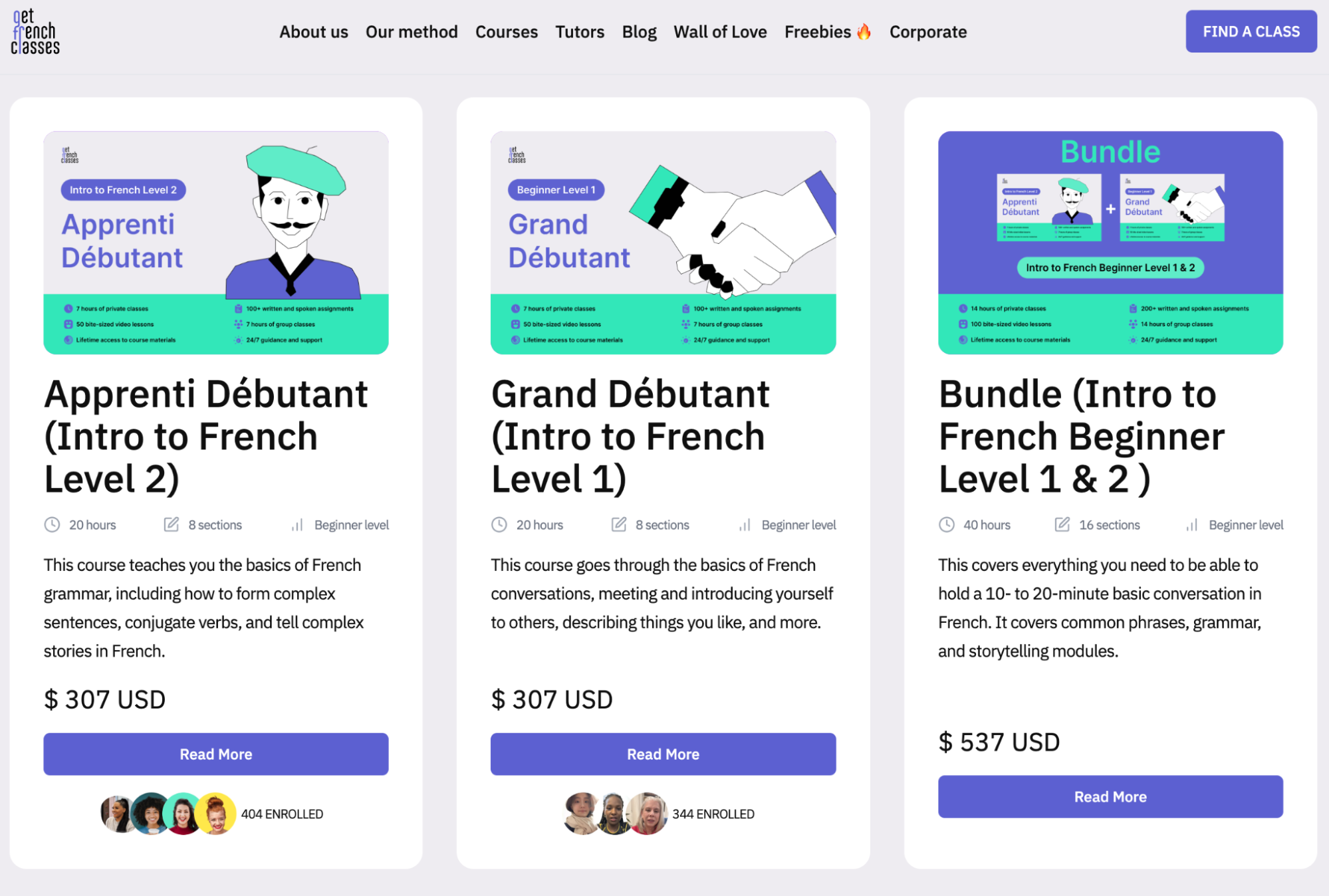
One of the biggest advantages of Get French Classes is its affordability and accessibility.
-
Private French tutors can charge anywhere from $45 to $90 per hour, which can quickly add up to hundreds or even thousands of dollars over the course of your language-learning journey.
-
Language immersion trips, while highly effective, are also prohibitively expensive for many learners and require taking significant time off work or school to travel to a French-speaking country.
Get French Classes, on the other hand, offers a comprehensive learning package for just $307.
This includes 50+ video lessons, 100+ assignments, 6 hours of private French classes , 6 hours of group classes, and access to a supportive community of fellow French learners.
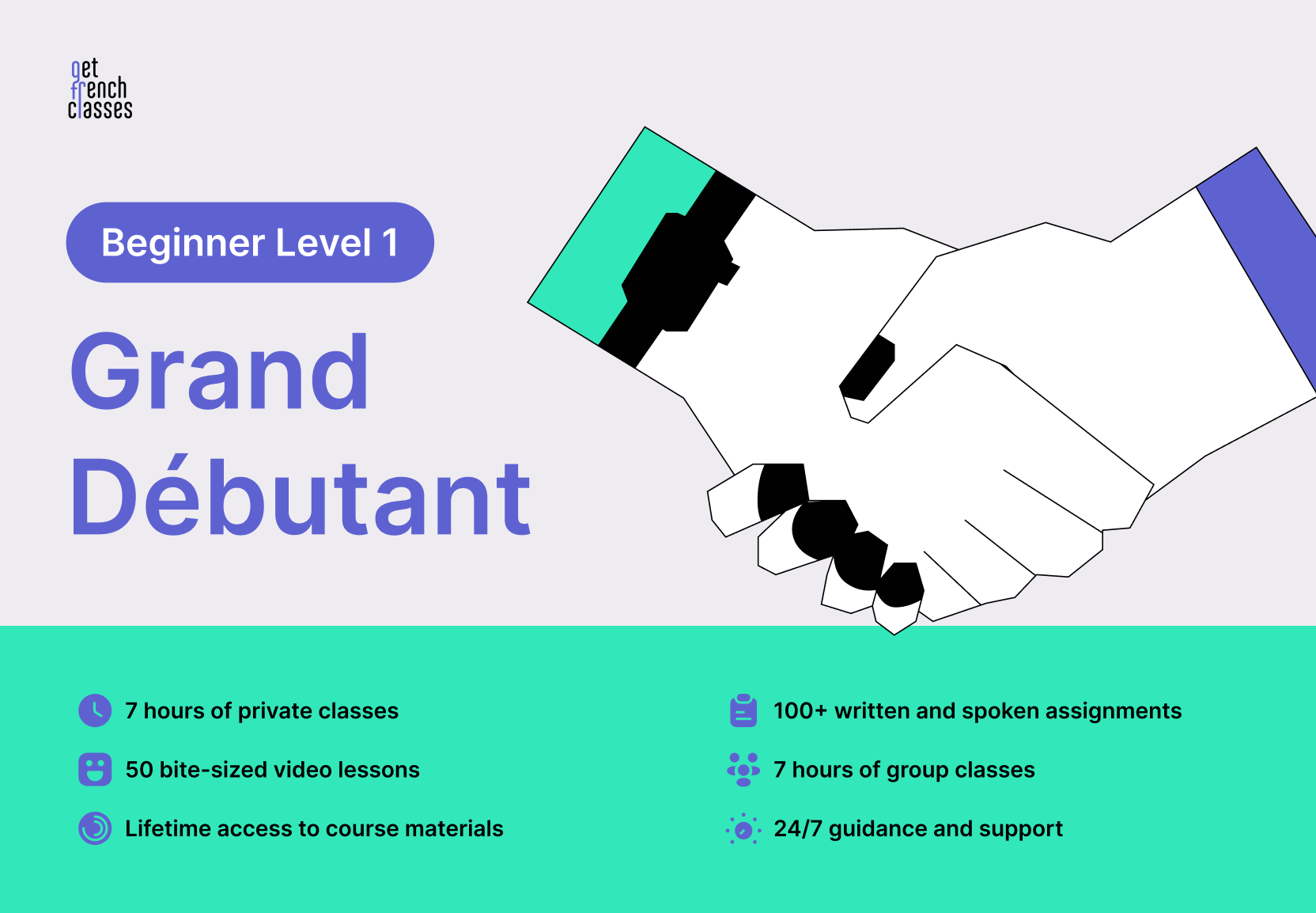
By combining self-paced learning, personalized instruction, and peer practice , Get French Classes provides a cost-effective and flexible alternative to traditional language learning methods.
Another key benefit of Get French Classes is its focus on building daily habits and providing structured learning paths.
Many learners struggle to make consistent progress with apps like Duolingo, which prioritize gamification and vocabulary memorization over authentic communication skills.
With Get French Classes, you'll engage in daily video lessons and assignments that are designed to fit easily into even the busiest schedules.
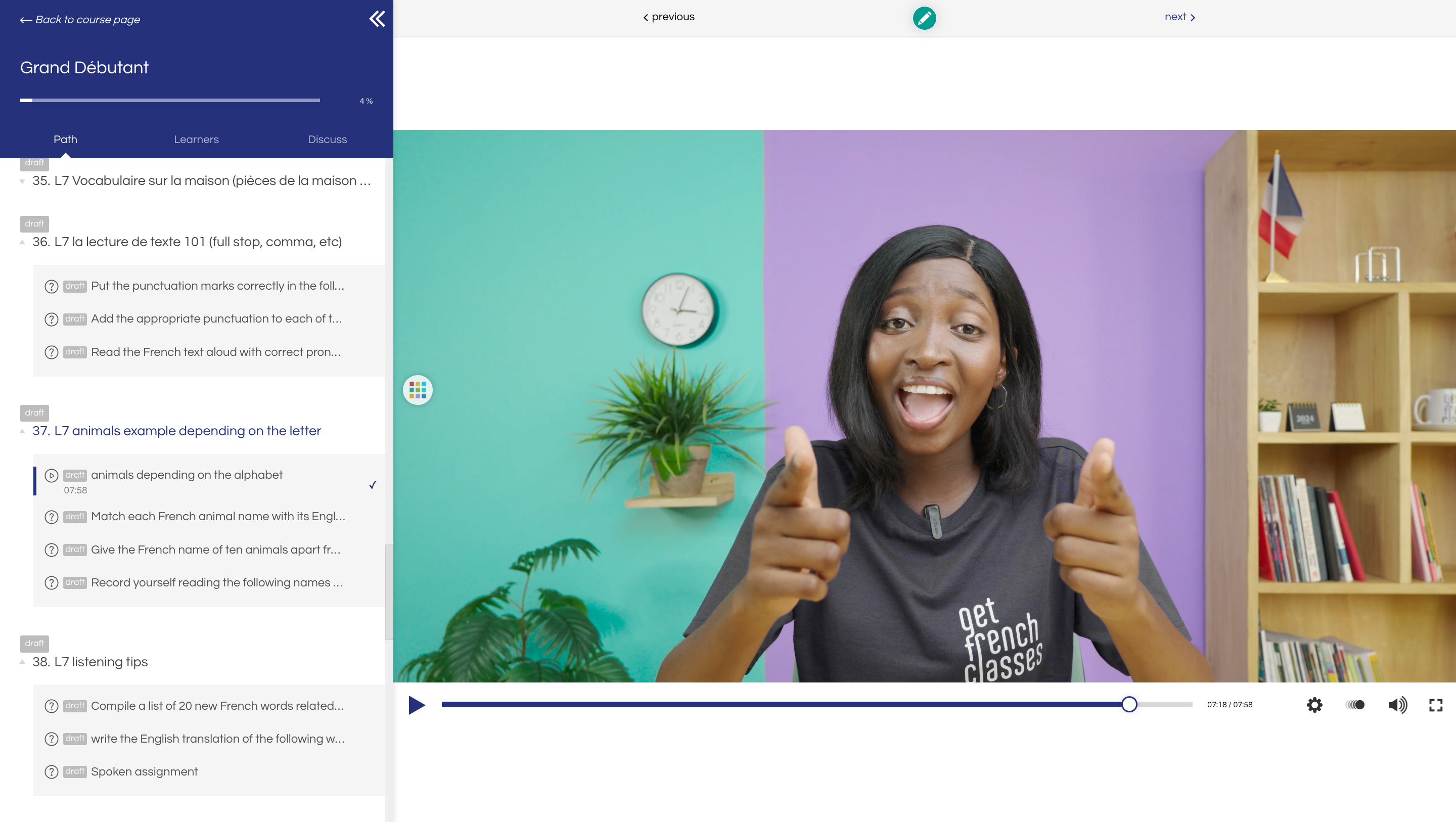
This approach helps you build momentum and stay motivated, while also ensuring that you're constantly challenged and exposed to new aspects of the language. What will enhance your language learning journey.
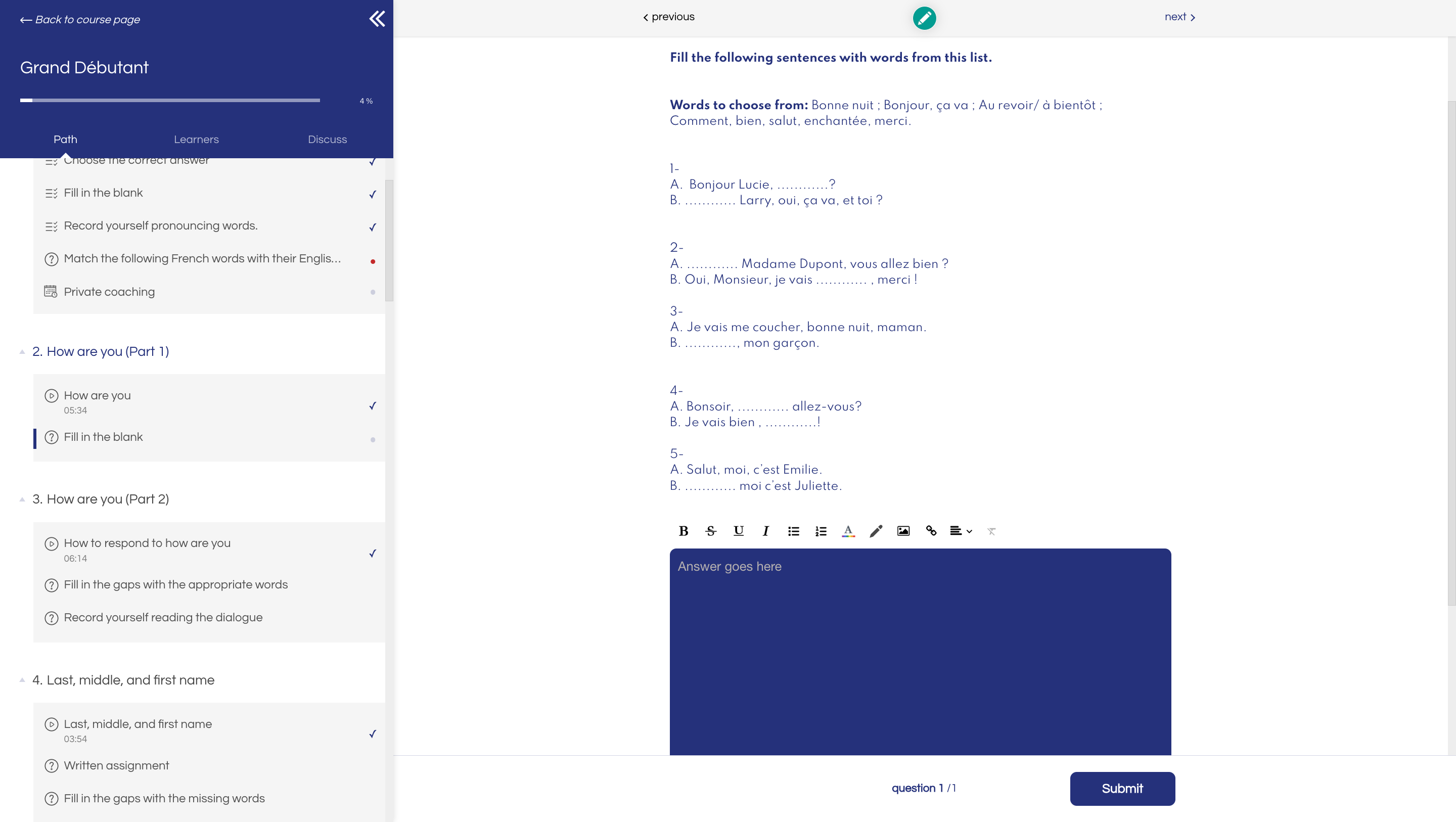
In addition to self-study materials, Get French Classes emphasizes the importance of real-world practice and feedback. Through private classes with experienced tutors , you'll have the opportunity to apply what you've learned in realistic scenarios and receive personalized guidance on your pronunciation, grammar, and fluency.
Our group classes and learning pods provide additional chances to practice your speaking skills and many oher language skills with other learners at a similar level, helping you build confidence and overcome the common obstacle of not having someone to speak with regularly.
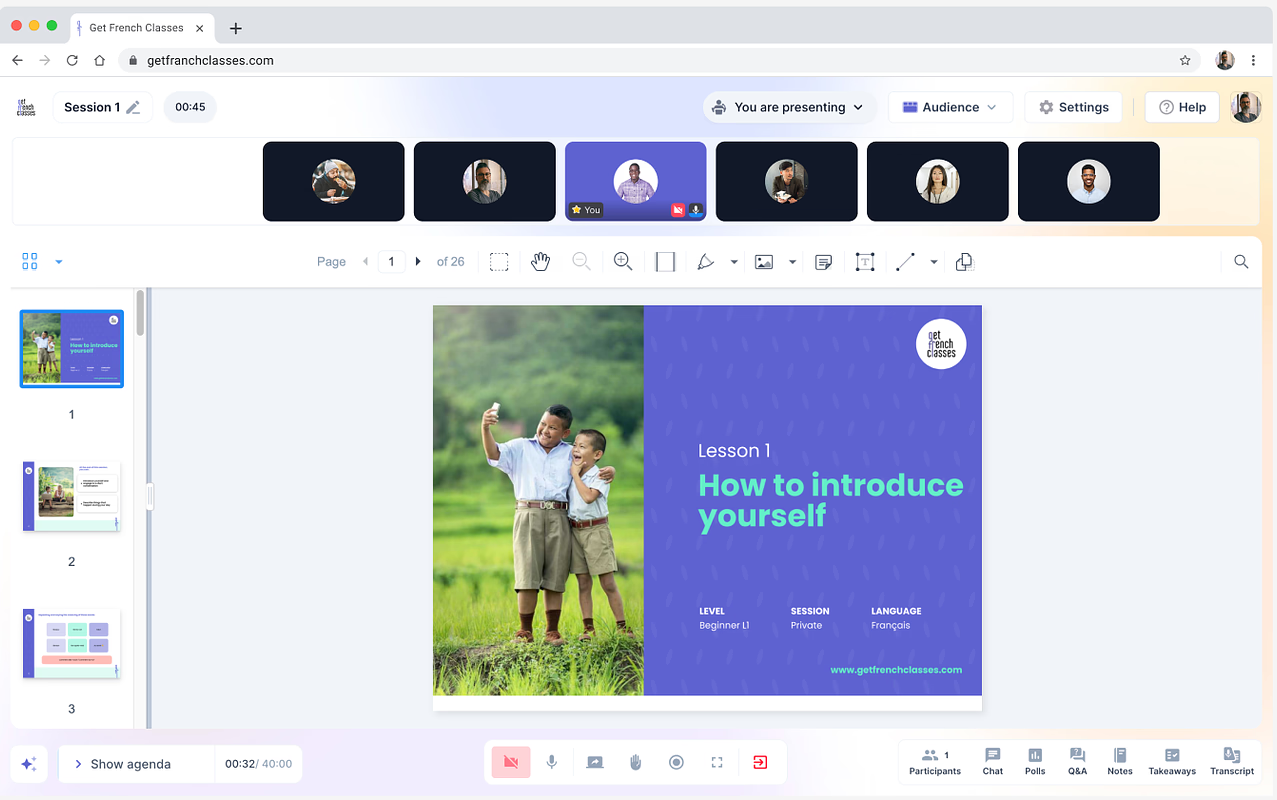
Last but not least, Get French Classes is designed to be truly effective at taking you from a beginner to an intermediate or advanced level of proficiency.
Here are some of our tutors:
Unlike Rosetta Stone and Babbel, which often leave learners plateaued at a basic level, Get French Classes provides a structured learning path that systematically builds your skills across all key areas of language acquisition: listening, speaking, reading, writing, vocabulary, grammar, and cultural understanding.
Here's what our learners say:

As a busy mom and professional, learning French has been complicated for me. But since I started learning with Get French Classes, I have seen my French improve FAST. Through the lessons, I not only get to practice every day, but I also have more opportunities than before. I can practice with my advisor, private tutor, and other learners like me.

What I like the most about the program is that all my tutors are native speakers. They do help me not only understand the French language, but also the culture and the nuances of some words and expressions. And mostly, the live sessions are engaging and fun.

I chose Get French Classes because their teaching materials and content are incredibly rich, going from everyday expressions to more specialized ones. I also get many opportunities to interact with tutors, and that has a huge impact on my fluency.
I've tried learning French on my own before, but nothing compares to this program. The combination of video lessons, live tutoring sessions, and group practice made learning French enjoyable and effective.
By immersing yourself in authentic French content and engaging in regular practice with native speakers and fellow learners, you'll develop the confidence and fluency needed to communicate effectively in real-life situations.
Below is a bird's-eye view of how Get French Classes differs from Rosetta Stone and Babbel.
| Feature | Get French Classes | Babbel | Rosetta Stone |
|---|---|---|---|
| Cost | $307 (one-time per level) | $199 (lifetime) | €399 |
| Content quality | Structured learning path, real-life scenarios | Content created by linguists and native speakers | Images and audios |
| Language-learning technology | Video lessons, assignments, and live private and group classes | Speech recognition, personalized review sessions | AI-powered feedback, adaptive difficulty |
| Pedagogical approach | Immersive, communication-focused, habit-building | Traditional methods, grammar-focused | Gamification, vocabulary memorization |
| Effectiveness | Designed to take learners from beginner to intermediate/advanced | Best for beginners, may plateau at the basic level | Effective for basic vocabulary, limited for fluency |
| Personalization | Private classes, group practice, and community support | Limited personalization | Adaptive learning, but no human feedback |
| Speaking practice | Private classes, group classes, and learning pods | Limited speaking practice | Speech recognition, but no conversation practice |
| Flexibility | Daily 5-minute video lessons, fits busy schedules | Structured lessons, but less flexibility | Short lessons, but no comprehensive learning path |
| Cultural understanding | Emphasis on real-life situations and authentic content | Some cultural context, but limited | Minimal cultural context or explanations |
| Languages offered | French only | 14 languages | 25 languages |
If you can, don’t choose neither Rosetta Stone nor Babbel
When it comes to learning a language, the ultimate goal should always be achieving fluency—not just racking up XP points or maintaining a streak on an app.
While Rosetta Stone may have a slight edge over Babbel in terms of content quality and structured learning, neither app is truly designed to take you to a high level of proficiency in your target language.
However, if you're specifically learning French and want a comprehensive, effective solution that goes beyond the limitations of Rosetta Stone and Babbel, Get French Classes is your best option.
Our language learning program is tailored to help you:
-
Learn with a structured, immersive curriculum that focuses on real-world communication skills
-
Engage with authentic, context-rich materials that prepare you for real-life scenarios and interactions
-
Practice speaking and build fluency through private classes, group sessions, and peer learning pods
-
Stay motivated and accountable as part of a supportive community of fellow French learners
-
Fit language learning into your busy schedule with flexible, bite-sized lessons and personalized feedback
Unlike Duolingo and Babbel, which offer a one-size-fits-all approach to language learning, Get French Classes provides a personalized, immersive experience that is designed specifically for French learners who are serious about achieving fluency.
